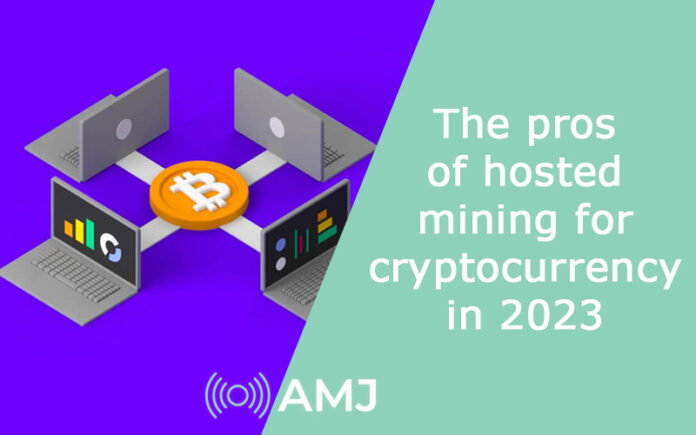Cryptocurrency mining has become increasingly popular in recent years, as more people are interested in participating in the decentralized financial system. While some miners choose to mine cryptocurrency on their own, others opt for crypto mining hosting, also known as hosted mining. Hosted mining involves renting out mining equipment from a third-party provider, who then takes care of the equipment’s setup and maintenance.
As with any mining method, there are pros and cons to consider before diving in. In this post, we’ll explore the benefits and drawbacks of hosted mining for cryptocurrency, and provide insights to help readers make an informed decision about whether it’s the right choice for them.
Contents [hide]
Understanding Hosted Mining
Hosted mining is a popular way for cryptocurrency miners to access mining hardware without having to purchase and maintain it themselves. This method, also referred to as cloud mining or mining as a service (MaaS), allows miners to rent equipment from a third-party provider. The hosting provider is responsible for managing the hardware, which is typically located in a remote data center. By remotely accessing the mining pool, miners can receive a portion of the mining rewards.
One of the primary benefits of hosted mining is the reduced setup costs and access to technical support from hosting providers. Additionally, miners can save money on electricity rates and have greater control over the equipment. With the help of professional technical support teams, hosted mining can also help miners optimize their mining operations and increase profitability.
Factors that Affect the Profitability of Hosted Mining
Several factors can impact the profitability of hosted mining. One such factor is mining difficulty, which determines the complexity of solving the mathematical problems required to mine cryptocurrency.
Additionally, electricity costs can significantly impact the profitability of hosted mining, as energy consumption is a significant expense for miners. Maintenance and repair costs are also crucial to consider, as miners may need to replace or repair mining equipment regularly. The availability of mining equipment is another crucial factor, as some hosting providers may have limited hardware available, leading to increased competition for access to equipment.
Finally, competition from other miners can also impact the profitability of hosted mining, as more miners vying for rewards can result in lower payouts for individual miners. Understanding these factors can help miners make informed decisions about whether hosted mining is a viable option for their needs.
Case Studies and Examples
Examining case studies and examples can help provide insights into the profitability of hosted mining. For instance, there are numerous examples of successful hosted mining operations, such as a company that experienced significant revenue growth by partnering with a hosting provider to scale its operations. Additionally, many hosting providers offer customizable packages that can provide greater flexibility and control for miners.
Comparing hosted mining to other mining methods, such as self-mining or cloud mining, can also help identify potential advantages and drawbacks. By analyzing real-world examples and comparing different mining methods, miners can gain a more comprehensive understanding of the potential benefits and challenges of hosted mining.
Other Factors to Consider
When it comes to technical knowledge and experience, hosted mining may require less technical expertise than other mining methods since the hosting provider is responsible for the setup and maintenance of the mining equipment. However, it’s still important for miners to have a basic understanding of mining processes and the ability to troubleshoot common issues.
In terms of contract length and flexibility, hosted mining providers may offer contracts of varying lengths, from short-term to long-term commitments. It’s important to carefully consider the length of the contract and any associated penalties for early termination, as well as the ability to upgrade or downgrade equipment as needed.
Customer support is also an important consideration when selecting a hosted mining provider. Look for a provider with a responsive and knowledgeable support team that can help you troubleshoot issues quickly and efficiently. Additionally, consider the availability of support, such as 24/7 support, as well as the quality of the provider’s online resources, such as documentation and user forums.
Overall, taking these additional factors into consideration alongside profitability can help ensure that you select a hosted mining provider that meets your needs and maximizes your chances of success.
Conclusion
In conclusion, hosted mining, also known as cloud mining, offers several advantages and disadvantages for cryptocurrency miners. The key advantages include reduced setup costs, access to professional technical support, lower electricity rates, and greater control over equipment.
However, the profitability of hosted mining is influenced by several factors, including mining difficulty, electricity costs, maintenance and repair costs, availability of mining equipment, and competition from other miners.
Additionally, technical knowledge and experience, contract length and flexibility, and availability and quality of customer support are also important considerations for miners.
Overall, hosted mining can be a viable option for some miners, but it is important to carefully consider the pros and cons before making a decision.
We recommend that readers research different hosting providers and compare their services, fees, and reputations before choosing a hosting service for their cryptocurrency mining operations.












![Index of Money Heist [Season 1, 2, 3 & 4 – All Episodes, Cast and Plot] Index of Money Heist](https://www.asiamediajournal.com/wp-content/uploads/2021/05/Index-of-Money-Heist-3-100x70.jpg)